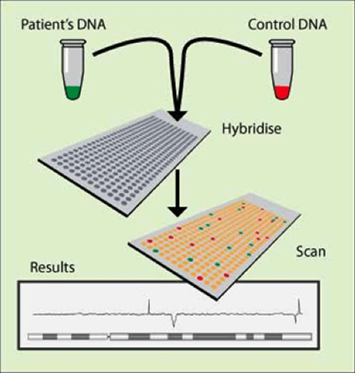
Chromosomal Microarray (CMA) Technology
- Home
- Chromosomal Microarray (CMA) Technology

Chromosomal microarray (CMA) testing looks for extra (duplicated) or missing (deleted) chromosomal segments, sometimes called copy number variants (CNVs). These include microdeletions and micro-duplications of chromosome segments, which are too small to see under a microscope but may contain multiple genes. Chromosome microarray will detect most abnormalities of chromosome number (trisomy, monosomy, etc.) including Down syndrome and balanced rearrangements of chromosome structure (translocations, etc.)
Methodology
“Chromosome Microarray” test is a microchip-based testing that allows automated analysis of many pieces of DNA strand labeled on the microchip. CMA chips use labels or probes that bond to specific chromosome regions. Computer analysis is used to compare a patient’s genetic material to that of a reference sample. A difference between a patient’s DNA and the reference sample is called a variant.
How is CMA Useful?
CMA is clearly useful for individuals who don’t fit a specific known syndrome (such as Down syndrome), but demonstrate any of the following:
Chromosome Microarray is also very helpful in detecting and diagnosing:
Tests: